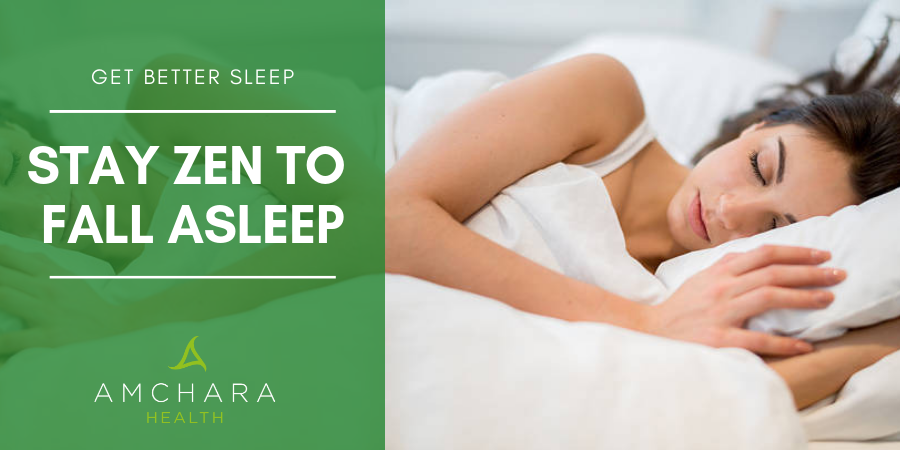Topics Covered in this article:
Sleep disruptions are common and affect nearly 40% of people in the UK.
Sleep disturbances include an inability to fall asleep, stay asleep or to achieve quality sleep.
A lack of sleep is linked to an increase in inflammation (1) and conditions such as heart disease (2), depression and anxiety (3).
Sleep is the time when the body and mind rest, recuperates and cleanses – chronic sleep loss can make day to day life difficult.
Our mission is to provide you with both insightful information and evidence-based content to provide you with actionable knowledge and tips you can trust, to help you on your journey to optimal health.
See if you can have a better night’s sleep with our 5 top tips:
1. Watch what you eat and drink
What you eat throughout the day can have a significant impact on your ability to sleep at night.
Certain foods and drinks can stimulate the stress response.
The stress response involves parts of the nervous system called the sympathetic and parasympathetic nervous systems.
These work together to allow stimulation or calm as needed.
The problem in modern society is that we spend more time in our stimulatory sympathetic nervous system than in the calming parasympathetic system.
This has the effect of making us ‘wired but tired’ and unable to nod off at the right time.
To maintain a balance, and prevent overstimulation, good blood sugar balance is needed throughout the day.
Avoiding sugars, sweet foods and refined, processed foods can be useful.
Adding in a good protein source with each meal slows digestion and allows a more even release of energy from food.
Keeping caffeine low and certainly avoiding it after midday is essential, as caffeine stimulates the adrenal glands – definitely something to avoid if you want better sleep.
Alcohol should also be avoided as whilst it may initially help you fall sleep, it will contribute to frequent night wakings and reduce the quality of your sleep.
A calming cup of tea an hour before bed may help to support parasympathetic pathways.
When we say tea, we don’t mean full caffeinated black tea but rather chamomile, valerian or decaffeinated green tea.
Green tea contains a nutrient called theanine, an amino acid that has been shown to increase alpha brain waves.
These are usually increased during states of deep meditation (4).
Don’t drink your calming tea too soon before bedtime or you may have to get up in the night to visit the bathroom.
2. Do a digital detox
Avoiding the use of smartphones, tablets, laptops, eBook readers and TVs a couple of hours before bedtime allows you to not only leave work-related e-mails and social pressures behind but also to reduce exposure to blue light.
Sleep is under the control of a hormone called melatonin which is produced at the onset of darkness. Blue light exposure may reduce melatonin levels and affect sleep patterns (5).
Make a rule to put your devices in another room (not the bedroom!) at a set time each evening and ensure your friends and family know this is what you plan on doing.
If you have no choice but to hop onto your laptop urgently then install software like f.lux, this changes the light settings on the screen and allows for a more amber glow, reducing blue light.
Amber tinted glasses are also available and may be of use if you wish to watch TV in the early evening.
Don’t rely on amber glasses for TV viewing as it is not the best way to unwind and relax before bed.
3. Form a bedtime habit
Humans are creatures of habit and our biological systems revolve around set habits.
Take the circadian rhythm for example – our internal time clock is set to just slightly over 24 hours and is heavily influenced by light.
Changing habits around light exposure can seriously disrupt the circadian rhythm and sleep cycles, as happens with shift workers (6).
Forming a good bedtime habit may help you unwind.
As noted above, an important initial step to forming a healthy sleep habit is to ditch your electrical devices.
Finding nourishing and calming activities in the last few hours before bed can prevent you from feeling ‘wired but tired’.
Start preparation for bed at roughly the same time every night and perhaps indulge in a good paperback, listen to calming music or have a warm bath.
Magnesium salts or lavender essential oils can be useful in the bath to enhance relaxation.
Magnesium is a mineral known for its relaxing properties so is great to help you unwind (7).
Raising your body temperature in a bath a few hours before bedtime may also assist with sleep, as sleep is stimulated by the resultant drop in temperature (8).
4. Set the scene
Having the right environment in the bedroom is essential.
The room in which you sleep should not be a source of stress and should be made as comfortable as possible to allow you to unwind fully.
Keeping the room in darkness aids melatonin synthesis and it is worth investing in blackout curtains or blinds.
As we know sleep is stimulated by a lowering in body temperature, so keeping the bedroom at around 18 degrees Celsius ensures you will not become too hot.
Make sure you have a comfortable mattress, consider replacing it if it is over 10 years old.
Although pillows and throws may make the bedroom look cosy, too many may not enable you to lie in a position conducive to relaxation.
The bedroom should only ever be used for sleep and intimacy – TVs, phones, tablets and laptops should be banned!
If you are noise sensitive it is worth investing in a set of earplugs to maximise your chance of an undisturbed night.
5. Calm your nervous system
This one is important, otherwise you may find it very difficult to fall asleep or find yourself overthinking your day if you happen to wake up in the middle of the night.
Activities that support the calming parasympathetic nervous system include relaxation techniques like progressive relaxation where you focus on various body parts, tensing and releasing muscles group by group.
Meditation and visualisation are also of use and if you find it difficult to focus on your own meditation or visualisation, invest in an audio guided meditation which can be downloaded through several apps and websites.
Using specific breathing techniques and focusing on inhalation and exhalation is also calming.
There are many different kinds of breathing techniques and what seems to be important is that exhalation lasts longer than inhalation.
Yoga not only supports flexibility and has a focus on breathing, it has also been shown to support the calming parasympathetic nervous system (9).
Gentle daily yoga can help you to unwind, relax and achieve better sleep.
Tackling sleep issues can feel daunting, particularly if they are long term issues.
Making small simple changes to your daily habits may help to give you a better night’s sleep.
The key is to be consistent – it may take more than a few nights to resolve long-standing sleep problems, but it is definitely worth persevering.
We believe that sharing knowledge and experience is an important part of achieving optimal health and would love to hear your experiences.
Tell us what has helped you to get a better night’s sleep?
What was the most beneficial change?
Have you tried one of our tips?
How did you get on?
Share your thoughts and experiences in the comments section.
By: Kelly Rose DipION FdSc VN
READ THIS NEXT:
- Blog Post: 14 Ways To Sleep Better Naturally
- Blog Post: Sleep: The Impact on Hormones and Your Health
- Blog Post: 5 Proven Ways To Unwind Before Bedtime





